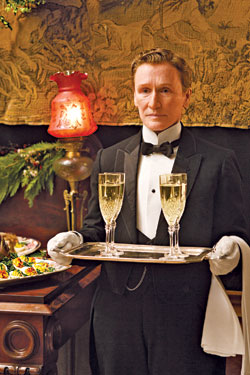
As the title character in Albert Nobbs, a woman impersonating a man in late-nineteenth-century Dublin, Glenn Close has cropped, orangey hair and a voice that rarely rises above a croak. Outdoors, she’s painfully ill at ease in an overlarge, three-piece black suit and a bowler hat. Inside the high-toned hotel and restaurant in which she lives and works as a waiter, she behaves with robotic obeisance, her lips pressed together, her searching eyes her only naturally moving parts. The performance is extraordinary, literally: Close resembles no man I’ve ever seen, or woman either. She’s the personification of fear—the fear of being seen through, seen for what she is.
This hushed, almost unbearably sad film is based on a story by George Moore published in 1918, long after its events had supposedly taken place. By then, readers could look back on poor Nobbs as a martyr to a more benighted view of women, and see the story’s other major character, Hubert Page—a woman who leaves her husband and children and becomes a (male) housepainter—as a kind of working-class version of Ibsen’s Nora. Close played Nobbs in a theatrical adaptation in the early eighties, just before her star-making appearance as a militant feminist in The World According to Garp, and has been working for the past two decades to repeat the role onscreen. The script she co-wrote with John Banville and Gabriella Prekop adds some melodramatic flourishes but sticks to Moore’s masochistic trajectory. Inspired by Hubert Page (Janet McTeer), who lives a cozy, blissful domestic existence with a dressmaker “wife” (Bronagh Gallagher), Albert dreams of opening a tobacco shop with a pert blonde housemaid, Helen (Mia Wasikowska), who’s already stepping out with the handsome boiler man (Aaron Johnson). Helen sees “Mr. Nobbs” as a ludicrous suitor but a potential source of money to escape with her man to America. Albert sees Helen as sweet salvation.
Is Albert Nobbs a “gay” film? I don’t think Eros enters into the equation. It’s more a matter of Albert and Hubert’s finding somewhere safe in a society that treats all poor people badly but poor women worse.
The director, Rodrigo García, helped Close give a buoyant, tender performance (her least histrionic) in the final segment of his omnibus film Nine Lives, and in Albert Nobbs he combines his gift for creating intimacy (he directed many episodes of In Treatment, as well as the wrenching Mother and Child) with a new attention to wide-screen bustle. The movie has no tight close-ups: Even in isolation, Albert is surrounded by people—chief among them the hotel’s mingy-minded mistress (the superb Pauline Collins)—who’d toss her into the street with the rest of the unemployed if they knew her secret. (The exception, Brendan Gleeson as a kind, drunken doctor who might have stepped out of a Chekhov play, has no idea who she is until it’s too late.) There is nowhere for Albert to be “herself,” if such a thing exists anymore. Even in her bed, she’s gnawed by fleas.
Close is very fine, at once tight and tremulous, but it’s a pity that it took so long for her and Albert to reunite. She was in her early thirties when she played the part onstage, a good age for Nobbs, who’d by then have spent two decades under wraps but could still look forward to a few decades more—and a whole new life. Thirty years on (Close is 64), her Albert is a hunched, wizened thing, a few years (if that) from being “a little old man.” It is not so much her sex as her seniority that makes her an inconceivable match for the girlish Helen, and so a fantasy that might have seemed unlikely but appealing is now obviously, thunderously delusional. At 50, McTeer is closer to seeming neither young nor old, male nor (in spite of her sprawling bosom, which she bares) female. She gives a marvelous performance, lightly ironic but above all easy, impishly at home in her present incarnation. Perhaps it’s her resemblance to Rachel Maddow that makes me see her as the movie’s beacon of potency. She looks as if she could set the whole country straight.
See Also:
Glenn Close on her role in Albert Nobbs
Albert Nobbs
Directed by Rodrigo García. R.
E-mail: filmcritic@newyorkmag.com
